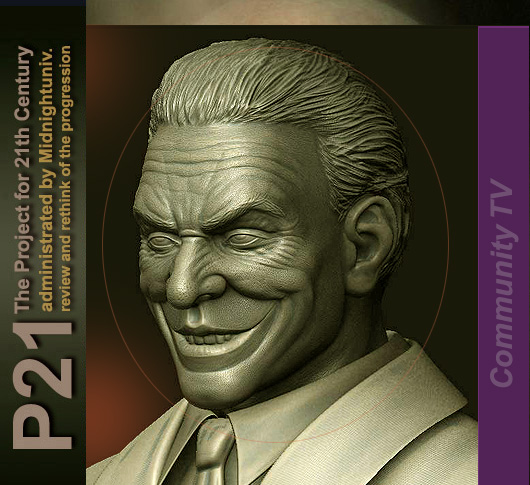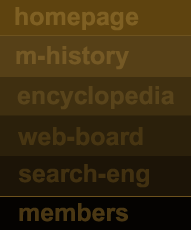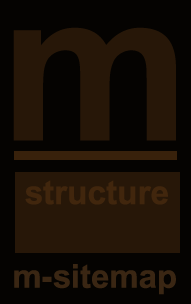



บรรณาธิการแถลง: บทความทุกชิ้นซึ่งได้รับการเผยแพร่บนเว็บไซต์แห่งนี้
มุ่งเพื่อประโยชน์สาธารณะ โดยเฉพาะอย่างยิ่ง เพื่อวัตถุประสงค์ในการขยายพรมแดนแห่งความรู้ให้กับสังคมไทยอย่างกว้างขวาง
นอกจากนี้ยังมุ่งทำหน้าที่เป็นยุ้งฉางเล็กๆ แห่งหนึ่งสำหรับเก็บสะสมความรู้ เพื่อให้ทุกคนสามารถหยิบฉวยไปใช้ได้ตามสะดวก
ในฐานะที่เป็นสมบัติร่วมของชุมชน สังคม และสมบัติที่ต่างช่วยกันสร้างสรรค์และดูแลรักษามาโดยตลอด.
สำหรับผู้สนใจร่วมนำเสนอบทความ หรือ แนะนำบทความที่น่าสนใจ(ในทุกๆสาขาวิชา) จากเว็บไซต์ต่างๆ
ทั่วโลก สามารถส่งบทความหรือแนะนำไปได้ที่ midnightuniv(at)gmail.com
(กองบรรณาธิการมหาวิทยาลัยเที่ยงคืน: ๒๘ มกาคม ๒๕๕๐)

Community Television
Midnight
University

โทรทัศน์ชุมชน: พื้นที่ใหม่ของเสรีภาพและประชาธิปไตย
สถานีโทรทัศน์ชุมชนในอาร์เจนตินา:
หน้าต่างแห่งอิสรภาพ
ภัควดี วีระภาสพงษ์ : แปล
โครงการสื่อเพื่อบริบทสิทธิมนุษยชน
มหาวิทยาลัยเที่ยงคืน
(คลิกอ่านต้นฉบับภาษาอังกฤษ)
บทความวิชาการต่อไปนี้เป็นส่วนหนึ่งของโครงการสื่อเพื่อบริบทสิทธิมนุษยชน
ของเว็บไซต์มหาวิทยาลัยเที่ยงคืน
ซึ่งเป็นโครงการที่ไม่หวังผลกำไร โดยมีวัตถุประสงค์เพื่อแสวงหาตัวอย่างและกรณีศึกษาเกี่ยวกับเรื่องสิทธิมนุษยชน
จากประเทศชายขอบทั่วโลก มาเป็นตัวแบบในการวิเคราะห์เพื่อเผชิญกับปัญหาสิทธิมนุษยชน(สิทธิชุมชน)ในประเทศไทย
สำหรับบทแปลชิ้นนี้ นำมาจากงานเขียนของ
Marie Trigona, เรื่อง
Community Television in Argentina: Agora TV, a Window for Liberation
Americas Program Citizen Action Profile (Silver City, NM: International
Relations Center, April 25, 2007). http://americas.irc-online.org/amcit/4173
เป็นเรื่องเกี่ยวกับการริเริ่ม และการต่อสู้เพื่อให้ได้มาซึ่งพื้นที่สื่อวิดีทัศน์ของชุมชน
ในอาร์เจนตินา แม้ว่าจะไม่มีกฎหมายรองรับ และต้องถูกรังควานจากตำรวจอยู่เสมอ
อย่างไรก็ตาม การต่อสู้ดังกล่าวยังคงดำเนินต่อไปในทุกด้าน เพื่อให้ได้มาซึ่งพื้นที่
เสรีภาพและประชาธิปไตยเพิ่มขึ้นของภาคประชาชน. ในเรื่องเกี่ยวกับ
การฝึกอบรมให้ภาคประชาชนสามารถใช้สื่อประเภทนี้เป็นเรื่องสำคัญ และ
ในด้านเงินทุนการดำเนินการก็เป็นสิ่งจำเป็นด้วยเช่นกัน แม้ว่าอุปสรรคจะมากมาย
แต่การเข้าครองพื้นที่สื่อและภาพเคลื่อนไหวนี้ เป็นเครื่องมือจำเป็นต่อขบวนการ
ทางการ เมืองภาคประชาชนในละตินอเมริกา และประเทศชายขอบทั่วโลก
midnightuniv(at)gmail.com
บทความเพื่อประโยชน์ทางการศึกษา
ข้อความที่ปรากฏบนเว็บเพจนี้
ได้รักษาเนื้อความตามต้นฉบับเดิมมากที่สุด
เพื่อนำเสนอเนื้อหาตามที่ผู้เขียนต้องการสื่อ กองบรรณาธิการเพียงตรวจสอบตัวสะกด
และปรับปรุงบางส่วนเพื่อความเหมาะสมสำหรับการเผยแพร่ รวมทั้งได้เว้นวรรค
ย่อหน้าใหม่ และจัดทำหัวข้อเพิ่มเติมสำหรับการค้นคว้าทางวิชาการ
บทความมหาวิทยาลัยเที่ยงคืน
ลำดับที่ ๑๔๗๒
เผยแพร่บนเว็บไซต์นี้ครั้งแรกเมื่อวันที่
๒๘ มกราคม ๒๕๕๑
(บทความทั้งหมดยาวประมาณ
๒๖ หน้ากระดาษ A4)
++++++++++++++++++++++++++++++++++++++++++++++++++++

โทรทัศน์ชุมชน: พื้นที่ใหม่ของเสรีภาพและประชาธิปไตย
สถานีโทรทัศน์ชุมชนในอาร์เจนตินา:
หน้าต่างแห่งอิสรภาพ
ภัควดี วีระภาสพงษ์ : แปล
โครงการสื่อเพื่อบริบทสิทธิมนุษยชน
มหาวิทยาลัยเที่ยงคืน
(คลิกอ่านต้นฉบับภาษาอังกฤษ)
ความนำ
ไม่มียุคไหนอีกแล้วในประวัติศาสตร์ละตินอเมริกา
ที่สื่อมวลชนตกอยู่ในกำมือกลุ่มคนเพียงไม่กี่คนเช่นนี้. ในอาร์เจนตินา การรวมศูนย์ของสื่อมวลชนเกิดขึ้นในช่วง
ค.ศ. 1976-1983 เมื่อรัฐบาลเผด็จการทหารเซ็นเซอร์สื่อสิ่งพิมพ์เกือบทั้งหมด และออกกฎหมายเข้มงวดเพื่อป้องกันไม่ให้ฝ่ายค้านได้แสดงความคิดเห็นอย่างเปิดเผย
กฎหมายสื่อมวลชนในอาร์เจนตินาที่ตกค้างมาจากยุคเผด็จการ ยังไม่มีการแตะต้องแก้ไขมาจนถึงทุกวันนี้
ถึงแม้จะมีอุปสรรคด้านกฎหมายก็ตาม แต่ในช่วงหลายสิบปีที่ผ่านมา มีกลุ่มนักเคลื่อนไหวหลายกลุ่มเกิดขึ้น
กลุ่มเหล่านี้ผลิตสื่อทางเลือกอิสระให้สถานีโทรทัศน์ สถานีวิทยุ และผลิตสื่อวีดีทัศน์
เพื่อตอบโต้ข้อมูลข่าวสารจอมปลอมของสื่อกระแสหลัก
สถานีโทรทัศน์อาโกรา
สถานีโทรทัศน์อาโกรา (Agora TV) (*) คือกลุ่มผลิตรายการโทรทัศน์ชุมชน ซึ่งถ่ายทอดทางอินเทอร์เน็ตอยู่ในขณะนี้
โครงการนี้ต้องการเข้าถึงผู้ชมทั่วโลกที่เป็นนักเคลื่อนไหวระดับรากหญ้าและประชาชนทั่วไปที่เบื่อหน่ายสื่อมวลชนกระแสหลัก
เว็บไซท์แห่งนี้นำเสนอผลงานวีดีทัศน์จากทั่วทั้งภูมิภาคละตินอเมริกาในประเด็นปัญหาต่าง
ๆ ไม่ว่าจะเป็นความขัดแย้งของแรงงาน ขบวนการสังคม การต่อสู้ของชาวพื้นเมือง และวีดีทัศน์ศิลปะเชิงทดลอง
กลุ่ม Grupo Alavio ซึ่งเป็นกลุ่มผลิตวีดีทัศน์ที่ตั้งอยู่ในกรุงบัวโนสไอเรส
เป็นผู้ก่อตั้งเว็บไซท์ www.agoratv.org ขึ้นใน ค.ศ. 2006 เพื่อเป็นเครื่องมือจัดตั้งและพื้นที่สื่อทางเลือกสำหรับกลุ่มต่าง
ๆ ที่ยังไม่สามารถเข้าถึงคลื่นความถี่ในการถ่ายทอดได้
(*)Agora TV Grupo Alavio, Argentine direct action and video collective has
participated in working class struggles and supported them with audio-visual
materials for over 15 years. Grupo Alavio has produced over 50 films dealing
with many social conflicts: occupied factories, unemployed worker organizations,
political prisoners, Mothers of Plaza de Mayo, subway workers struggling for
a 6 hour workday, art and Iraq. Alavio just launched the internet community
TV station, (www.agoratv.org)
ความเป็นมาวีดีทัศน์เพื่อสังคม
การทำกิจกรรมทางสังคมด้วยวีดีทัศน์ในปัจจุบัน มีรากเหง้าลึกซึ้งมาจากวงการภาพยนตร์และขบวนการศิลปะในละตินอเมริกา
ระหว่างช่วงทศวรรษ 1960 และ 1970 กลุ่มต่าง ๆ ในอาร์เจนตินา เช่น Cine de la
Base และ Cine Liberacion เริ่มสร้างคุณูปการด้านภาพยนตร์การเมืองในอเมริกาใต้
บอกเล่าเรื่องราวของชนชั้นแรงงานและการต่อสู้เพื่ออิสรภาพของชาติ. สถานีโทรทัศน์ใต้ดินหรือการแพร่ภาพผิดกฎหมายมีมาตั้งแต่ยุคเผด็จการ
ในสมัยนั้น กลุ่มเหล่านี้จะดักสัญญาณถ่ายทอด ขัดจังหวะรายการโทรทัศน์ตามปรกติ
เพื่อออกอากาศเกี่ยวกับข้อมูลของขบวนการใต้ดินที่ต่อต้านรัฐบาลทหาร ซึ่ง"อุ้ม"นักกิจกรรม
ผู้ใช้แรงงาน และนักศึกษาหายสาบสูญไปเป็นจำนวนมาก กลุ่มเหล่านี้ต้องเผชิญกับการกวาดล้างและความรุนแรงอย่างไม่ปรานี.
เรย์มุนโด เกลย์เซอร์ (Raymundo Gleyzer) ผู้กำกับภาพยนตร์และผู้ก่อตั้งกลุ่ม
Cine de la Base ถูกกองทหารคอมมานโด"อุ้ม"หายไปใน ค.ศ. 1976 ส่วนผู้กำกับภาพยนตร์คนอื่น
ๆ อีกหลายคนจำต้องลี้ภัยออกนอกประเทศ
ไม่มีกฎหมายจำกัดการเป็นเจ้าของสื่อ
ระบอบเผด็จการใช้วิธี"อุ้ม"ประชาชนหายสาบสูญ ไม่เพียงเพื่อข่มขู่ฝ่ายค้านเท่านั้น
แต่เพื่อสร้างเงื่อนไขทางการเมืองที่เบิกทางให้แก่การยัดเยียดโมเดลทางเศรษฐกิจแบบเสรีนิยมใหม่ด้วย
เนื่องจากไม่มีกฎหมายจำกัดการเป็นเจ้าของสื่อมวลชน อีกทั้งไม่มีนโยบายสาธารณะที่ส่งเสริมความหลากหลายของสื่อ
จึงนำไปสู่การผูกขาดสื่อในปัจจุบัน สื่อเกือบทั้งหมดในประเทศตกอยู่ในความควบคุมของบริษัทยักษ์ใหญ่ด้านสื่อมวลชนเพียงไม่กี่บริษัท
บริษัท Clarin, Telefonica และ Telecom เป็นกลุ่มบริษัทที่ใหญ่ที่สุด ซึ่งดำเนินธุรกิจสถานีโทรทัศน์
หนังสือพิมพ์ เคเบิลทีวี อินเทอร์เน็ต โทรศัพท์และวิทยุ
กฎหมายการแพร่สัญญาณวิทยุของอาร์เจนตินา (Ley de Radiodifusion 22.285) มีมาตั้งแต่ ค.ศ. 1980 ในขณะที่ระบอบเผด็จการทหารยังเรืองอำนาจ. ฆอร์เก ราฟาเอล วิเดลา ผู้นำเผด็จการในสมัยนั้น เป็นผู้ออกกฎหมายฉบับนี้ ซึ่งอำนวยผลกำไรมหาศาลแก่เจ้าของสื่อเอกชน ทำให้สื่อทั้งหลายสนับสนุนระบอบเผด็จการ และปิดปากนักข่าวไม่ให้รายงานการสังหารหมู่อย่างเป็นระบบที่เกิดขึ้นภายในประเทศ หน่วยทหารคอมมานโดสังหารนักข่าวไปกว่า 100 คน ในยุคเผด็จการทหาร
นับตั้งแต่อาร์เจนตินาฟื้นระบอบประชาธิปไตยใน ค.ศ. 1983 กฎหมายฉบับนี้ได้รับการปรับปรุงแก้ไขเพียงเล็กน้อยเท่านั้น แต่ไม่ว่าแก้ไขอย่างไรก็ยังคงส่งเสริมการครอบครองและผูกขาดสื่อโดยภาคเอกชน ตามกฎหมายฉบับนี้ เฉพาะปัจเจกบุคคลหรือกลุ่มเชิงพาณิชย์ที่จดทะเบียนในประเทศเท่านั้น ที่มีสิทธิ์ขอใบอนุญาตแพร่สัญญาณโทรทัศน์หรือวิทยุ ส่วนกลุ่มที่ไม่แสวงหากำไร, มหาวิทยาลัย, สหกรณ์, หรือสมาคมของชุมชน, ไม่มีสิทธิ์ขอใบอนุญาตแพร่สัญญาณ. ในสายตาของสถานีวิทยุและโทรทัศน์ชุมชน กฎหมายฉบับนี้คือซากตกค้างจากยุคการปกครองอำนาจนิยม ซึ่งจงใจขัดขวางการแพร่สัญญาณของสื่อนอกกระแสอย่างถูกกฎหมาย
กลุ่มธุรกิจกอบโกยผลประโยชน์จากกฎหมายฉบับนี้ ทำให้การนำเสนอข่าวสารภายในประเทศออกมาในทิศทางเดียวกัน อดีตประธานาธิบดีคาร์โลส เมเนม ได้แปรรูปสถานีวิทยุและโทรทัศน์ของรัฐหรือของสาธารณะให้แก่ภาคเอกชนใน ค.ศ. 1990 สถานีที่ถูกแปรรูปได้รับสิทธิ์แพร่สัญญาณจนถึง ค.ศ. 2005 มีกลุ่มธุรกิจหลายกลุ่มที่ได้สัมปทานสิทธิ์มากกว่า 24 สถานี ทั้ง ๆ ที่กฎหมายระบุว่า กลุ่มธุรกิจแต่ละกลุ่มสามารถครอบครองสัมปทานสิทธิ์มากที่สุดเพียงแค่ 4 สถานีเท่านั้น. ใน ค.ศ. 2005 ประธานาธิบดี เนสเตอร์ เคียร์ชเนอร์ แก้ไขกฤษฎีกาฉบับ 527/05 ของประธานาธิบดีเมเนม โดยต่ออายุสัมปทานขั้นต้นให้กลุ่มธุรกิจสื่อมวลชนอีก 35 ปี สถานีโทรทัศน์ที่ใหญ่ที่สุดสามอันดับแรกของประเทศ จะยังอยู่ในกำมือของกลุ่มธุรกิจใหญ่ ๆ ต่อไป กลุ่มเหล่านี้ประกอบด้วย
- นายดานีเอล ฮาดัด เจ้าพ่อสื่อมวลชนปีกขวาจะครอบครองช่อง 9 ไปจนถึง ค.ศ. 2019
- กลุ่ม Clarin จะเป็นเจ้าของช่อง 13 จนถึง ค.ศ. 2025 และ
- บริษัทสเปน Telefonica จะยึดครองสถานีโทรทัศน์ Telefe (ช่อง 11) จนถึง ค.ศ. 2025
การต่อสู้เพื่อก่อตั้งสถานีโทรทัศน์ชุมชน
ทั่วทั้งภูมิภาคอเมริกาใต้ กลุ่มประชาชนพยายามต่อสู้เพื่อก่อตั้งสถานีโทรทัศน์ถาวรของชุมชน
และต้องเผชิญอุปสรรคต่าง ๆ นานามากขึ้นเรื่อย ๆ ไม่ว่าจะเป็นการขัดขวางของรัฐบาลหรือการขาดแคลนโครงสร้างพื้นฐาน
ประสบการณ์ที่เป็นตัวอย่างมีอาทิ สถานีโทรทัศน์ยูโทเปีย (Utopia TV) สถานียูโทเปียเป็นสถานีโทรทัศน์ที่แพร่ภาพ
24 ชั่วโมงในเขตกรุงบัวโนสไอเรส ตั้งแต่ ค.ศ. 1992-97 รายการประกอบด้วยข่าวประจำวันหนึ่งชั่วโมงเต็ม
ที่สะท้อนการต่อสู้กับลัทธิเสรีนิยมใหม่ในยุครัฐบาลอดีตประธานาธิบดีคาร์โลส เมเนม
สถานีนี้ทำหน้าที่เป็นกระบอกเสียงให้การยึดที่ดินที่เกิดขึ้นทั่วไปในย่านอุตสาหกรรมชานเมืองของกรุงบัวโนสไอเรส
กลุ่มผู้รับบำนาญที่ต่อสู้เพื่อศักดิ์ศรีหลังจากทำงานมาชั่วชีวิต กลุ่มแม่แห่งปลาซาเดมาโย
(Mothers of Plaza de Mayo) ที่ต่อสู้กับกฎหมายนิรโทษกรรม ซึ่งจะไม่เอาผิดนายทหารที่ตกเป็นผู้ต้องหาอาญาด้านสิทธิมนุษยชน
ไปจนถึงการก่อกบฏในเมืองซัลตาทางภาคเหนือ มีกลุ่มต่าง ๆ หลากหลายเข้ามามีส่วนร่วมในสถานีแห่งนี้
จัดทำรายการด้านดนตรีและศิลปะที่เน้นความเคลื่อนไหวในท้องถิ่น
สถานีโทรทัศน์ยูโทเปียไม่เคยมีสถานะทางกฎหมายและถูกตำรวจบุกเข้ารื้อค้นสถานีเป็นประจำ สถานีนี้ตั้งอยู่ที่ชั้นที่ 21 ของตึกอพาร์ตเมนต์ในย่านฟลอเรส ตำรวจยึดอุปกรณ์ของสถานีไปนับครั้งไม่ถ้วน แต่นักกิจกรรมด้านสื่อมวลชนของสถานีนี้ก็สร้างเครื่องส่งสัญญาณขึ้นมาเอง สามารถนำมาใช้งานแทนอุปกรณ์ที่ถูกยึดหรือแตกหักเสียหายได้ทันท่วงที มีหลายครั้งขณะกำลังถ่ายทำภาพยนตร์กลางถนน ตำรวจก็บุกเข้ามาจับกุมผู้ร่วมงานและทำลายกล้องถ่ายหนัง กระทั่งในที่สุด สถานีแห่งนี้ต้องปิดตัวลงเนื่องจากถูกตำรวจรังควานอย่างไม่ปรานีปราศรัย
เนื่องจากการก่อตั้งสถานีอย่างถูกกฎหมายมีโอกาสเลือนราง นักกิจกรรมหลายกลุ่มจึงไม่ค่อยมีแรงจูงใจที่จะสร้างสถานีโทรทัศน์ชุมชนขึ้นมา ถึงแม้ในแวดวงนักกิจกรรมและชุมชน รวมถึงชนชั้นแรงงานอยากมีสื่ออิสระใจจะขาด เพื่อจะได้เผยแพร่และเชื่อมโยงการต่อสู้ของตน สถานีโทรทัศน์ที่พลเมืองเป็นผู้บริหารจะช่วยสร้างความเข้มแข็งแก่ภาคประชาสังคม ก่อให้เกิดความสมานฉันท์ แบ่งปันความรู้ และส่งเสริมความนับถือตัวเองในหมู่พลเมืองที่เข้ามามีส่วนร่วม สถานีโทรทัศน์อาโกรากำลังทำหน้าที่ดังกล่าว นั่นคือ การสร้างพื้นที่เพื่อการแสดงออกและปฏิสัมพันธ์ กระตุ้นองค์กรและขบวนการสังคม ให้ออกมาบอกเล่าเรื่องราวของตนผ่านทางสื่อวีดีทัศน์
วาระทางเลือก: มองโลกจากสายตาของชนชั้นแรงงาน
สถานีโทรทัศน์อาโกรา เป็นโครงการโทรทัศน์ชุมชนทางเลือก โดยถ่ายทอดผ่านทางเว็บไซท์
www.agoratv.org ในตอนแรกเริ่มนั้น กลุ่มผลิตวีดีทัศน์ Grupo Alavio สร้างเว็บไซท์นี้ขึ้นมา
เพื่อเป็นสถานีโทรทัศน์ในระดับชุมชนเมืองของกรุงบัวโนสไอเรส แต่กลุ่มต้องประหลาดใจที่เว็บไซท์นี้กลายเป็นเครื่องมือสื่อมวลชนที่ทรงพลัง
มีผู้ชมหลายพันคนจากทั่วโลกเข้ามาชมวิดีโอที่หาชมไม่ได้ในสถานีโทรทัศน์เชิงพาณิชย์
เป้าหมายของสถานีโทรทัศน์อาโกราคือ เปิดโอกาสให้ผู้ชมได้เข้าถึงสื่อมวลชนและใช้สื่อเป็นเครื่องมือเปลี่ยนแปลงสังคม
คำว่า อาโกรา (Agora) มาจากศัพท์ภาษากรีก agora โดยรากศัพท์หมายถึงสมัชชาของปวงชน หรือจัตุรัสสาธารณะ ที่ประชาชนมาพบปะและสร้างปฏิบัติการทางการเมืองในรูปแบบของประชาธิปไตยทางตรง. Grupo Alavio เป็นผู้บริหารเว็บไซท์นี้ก็จริง แต่สถานีโทรทัศน์อาโกราเป็นพื้นที่เปิดสำหรับกลุ่มผลิตวีดีทัศน์และกลุ่มต่าง ๆ ที่จะเข้ามาเผยแพร่วิดีโอของตน แนวคิดคือเปิดโอกาสให้ขบวนการสังคมและผู้ผลิตวิดีโอ เข้ามาใช้สถานีอาโกราเป็นเวทีบอกกล่าว แสดงทัศนะ. พื้นฐานของโครงการคือประยุกต์ใช้เทคโนโลยีอินเทอร์เน็ตเพื่อผลประโยชน์ของชุมชน. Grupo Alavio กำลังดำเนินงานด้านการฝึกอบรมแก่กลุ่มต่าง ๆ เพื่อให้กลุ่มต่าง ๆ สามารถผลิตสื่อด้านโสตทัศน์ด้วยตนเอง รวมทั้งเปลี่ยนผู้ชมจากผู้บริโภคที่เฉื่อยชาให้กลายเป็นผู้ชมที่รู้จักวิพากษ์วิจารณ์ สถานีโทรทัศน์อาโกราจึงเป็นหน้าต่างเพื่ออิสรภาพ สร้างจินตภาพใหม่ ๆ ที่สะท้อนถึงความสนใจและความต้องการ โดยเฉพาะทัศนะของชนชั้นแรงงานและประชาชนที่ถูกเอารัดเอาเปรียบ
สถานีโทรทัศน์ออนไลน์อย่างอาโกรามีวิธีการเข้าถึงที่เรียบง่าย กล่าวคือ ผู้ชมเพียงแค่มีอินเทอร์เน็ตแบนด์วิดท์ และ Flash ซึ่งเป็นโปรแกรมที่ดาวน์โหลดได้โดยไม่เสียค่าใช้จ่าย เพียงเท่านี้ก็รับชมวิดีโอออนไลน์ได้แล้ว หน้าหลักของเว็บไซท์นำเสนอรายการวีดีทัศน์ล่าสุด ซึ่งสลับสับเปลี่ยนกันไปทุกสัปดาห์ ผู้ชมสามารถเลือกชมวิดีโอจากประเภทของการรณรงค์ (เช่น การเรียกร้องให้นำพยานที่หายตัวไปชื่อ ฆอร์เก ฆูลิโอ โลเปซ กลับมาอย่างปลอดภัย, การเรียกร้องเสรีภาพแก่นักโทษการเมือง, และการเรียกร้องให้อิสราเอลยุติการยึดครองดินแดนของปาเลสไตน์ ฯลฯ)
นอกจากนี้ ยังมีการแบ่งประเภทด้วยวันสำคัญในประวัติศาสตร์ เช่น วาระครบรอบ 70 ปีของสงครามกลางเมืองสเปน, วาระครบรอบ 30 ปีของการรัฐประหารโดยกองทัพในอาร์เจนตินา, วันสตรีสากล ฯลฯ และมีการจัดประเภทวิดีโอโดยแบ่งตามแกนเรื่องหลัก เช่น การต่อสู้ของแรงงาน, การสร้างขบวนการอิสระ, ขบวนการสังคม, การต่อสู้ด้านสิ่งแวดล้อม, การกอบกู้โรงงานและสถานประกอบการโดยคนงาน, นักโทษการเมือง, เพศสภาพ, การต่อสู้ของแรงงานในไร่นา, ชาวพื้นเมือง, วัฒนธรรมพื้นบ้าน, วิดีโอทดลอง, มิวสิควิดีโอ, สิทธิมนุษยชน, ความทรงจำในประวัติศาสตร์ และอื่น ๆ อีกมากมาย ในประการสุดท้าย ผู้ชมสามารถสำรวจดูเว็บไซท์โดยเลือกจากการจัดแบ่งตามพื้นที่ภูมิศาสตร์ วิดีโอในส่วนของภูมิภาคละตินอเมริกามีการจัดแบ่งตามประเทศ (เท่าที่มีอยู่ในขณะนี้คือประเทศโบลิเวีย, บราซิล, ชิลี, เอกวาดอร์, กัวเตมาลา, เม็กซิโก, ปารากวัย, อุรุกวัยและเวเนซุเอลา)
กว่า 15 ปีแล้วที่ Grupo Alavio มีส่วนร่วมในการต่อสู้ของชนชั้นแรงงาน และทุ่มเทความพยายามสนับสนุนพวกเขาด้วยสารคดีเชิงสังคมและการเมือง งานของ Grupo Alavio ให้ความสำคัญลำดับต้น ๆ แก่การเกื้อหนุนให้ประชาชนที่ถูกเอารัดเอาเปรียบ สามารถเข้าถึงเทคโนโลยีและความชำนาญ ด้วยการสร้างความเป็นประชาธิปไตยในการผลิตสื่อโสตทัศน์และการใช้ภาษา. กลุ่ม Grupo Alavio ต้องการนำเสนอความเปลี่ยนแปลงอย่างถึงรากถึงโคนในด้านการสร้างสรรค์ บริหาร และกระจายสื่อ โดยอาศัยสถานีโทรทัศน์อาโกราเป็นเวที
ความถูกต้องตามกฎหมายกับความชอบธรรม
ถึงแม้ต้องเผชิญกับกฎหมายที่ตกค้างจากยุคเผด็จการ แต่กลุ่ม Grupo Alavio กำลังต่อสู้เพื่อสร้างประสบการณ์แก่โทรทัศน์ชุมชน
แนวคิดก็คือสร้างความชอบธรรมขึ้นมาก่อน จากนั้นจึงค่อยต่อสู้เพื่อความถูกต้องตามกฎหมาย
ตรรกะของผู้จัดตั้งสถานีโทรทัศน์ชุมชนจึงคล้ายคลึงกับตรรกะของกิจการที่คนงานกอบกู้ในอาร์เจนตินา
ในเมื่อไม่มีทางเลือกอื่นเหลืออีกแล้ว คนงานจึงตัดสินใจยึดสถานประกอบการและเข้าไปดูแลการผลิตด้วยตนเอง
ต่อมาในภายหลัง เมื่อได้รับการสนับสนุนจากชุมชนและพิสูจน์แล้วว่า คนงานสามารถบริหารโรงงานได้
คนงานจึงเรียกร้องความถูกต้องตามกฎหมาย จนถึงปัจจุบัน รัฐไม่เต็มใจแก้ไขกฎหมายสื่อมวลชน
นักกิจกรรมจึงเห็นว่า วิธีเดียวที่จะทำให้กฎหมายเปลี่ยนแปลงก็คือ บังคับให้ผู้ออกกฎหมายต้องยอมรับข้อเรียกร้องอันชอบธรรมของพลเมืองในการเข้าถึงคลื่นความถี่
นอกจากสถานีโทรทัศน์อาโกรา มีสถานีโทรทัศน์ชุมชนอีกจำนวนหนึ่งกระจายอยู่ทั่วย่านชานเมืองของกรุงบัวโนสไอเรส ประกอบด้วย TV Piquetera, TV Claypole และ TV Libre จากเขตมาตันซา TV Claypole และ TV Libre มีเครื่องส่งสัญญาณโทรทัศน์กำลังต่ำและถ่ายทอดภายในพื้นที่จำกัด แต่ไม่มีใบอนุญาตตามกฎหมาย. สำหรับ TV Piquetera ใช้คลื่นสัญญาณแบบสถานีโทรทัศน์ใต้ดินระหว่างการปิดถนน และถ่ายทอดจากละแวกบ้านในย่านคนจน. TV Piquetera ก่อตั้งใน ค.ศ. 2001 ในละแวกบ้านชนชั้นแรงงาน ตามชายตะเข็บของกรุงบัวโนสไอเรส นับแต่นั้นมา สถานีก็ถ่ายทอดสัญญาณจากฐานที่ตั้งในละแวกบ้านต่าง ๆ หมุนเวียนเปลี่ยนกันไป จนถึงบัดนี้ การถ่ายทอดสัญญาณจะมีตารางเวลาตามวันที่ที่กำหนด หรือตามกิจกรรมพิเศษต่าง ๆ การที่สถานีโทรทัศน์ชุมชนเหล่านี้ถ่ายทอดได้ไม่ต่อเนื่อง สาเหตุหลักเป็นเพราะขาดการประสานงานในด้านการผลิต ขาดการฝึกอบรม และขาดเวลาอันมีค่า เนื่องจากต้องเสียเวลาไปกับการต่อสู้เพื่อแก้ไขกฎหมายการถ่ายทอดคลื่นสัญญาณวิทยุโทรทัศน์
การฝึกอบรมและการมีส่วนร่วมของประชาชน
เทคโนโลยีสถานีโทรทัศน์ใต้ดินเป็นเทคโนโลยีที่ค่อนข้างง่าย เปรียบได้กับสถานีวิทยุใต้ดิน
แต่สิ่งที่แตกต่างจากสถานีวิทยุก็คือ โทรทัศน์ต้องการคุณภาพการผลิตสูงเพื่อเตะตาผู้ชม
การผลิตจำเป็นต้องอาศัยความชำนาญในด้านการถ่ายทำสารคดี และการตัดต่อ การรู้จักเล่าเรื่องผ่านภาพพจน์ทางโสตทัศน์คือความท้าทายที่ยิ่งใหญ่ที่สุดสำหรับผู้ผลิตสื่อชุมชน
กล้องถ่ายภาพยนตร์ดิจิตัลราคาไม่แพง และนักกิจกรรมรุ่นใหม่ที่มีความรู้ความเข้าใจในเรื่องสื่อ คือปัจจัยที่นำไปสู่ความเฟื่องฟูในการเคลื่อนไหวทางสังคมด้วยวีดีทัศน์ ขณะที่อาร์เจนตินาเผชิญวิกฤตการณ์ทางเศรษฐกิจครั้งเลวร้ายที่สุดในปี ค.ศ. 2001 มีนักเคลื่อนไหวทางสังคมด้วยวีดีทัศน์รุ่นใหม่ก้าวออกสู่ท้องถนน เพื่อถ่ายทำขบวนการต่าง ๆ ที่เบ่งบานจากการลุกฮือของประชาชนในเดือนธันวาคม กระนั้นก็ตาม ผู้สร้างภาพยนตร์ส่วนใหญ่มักสนใจเพียงแค่เหตุการณ์ที่น่าตื่นตาตื่นใจ มากกว่าการต่อสู้ประจำวันในองค์กรแรงงานไร้งาน การยึดที่ดิน สหภาพแรงงานและกิจการที่คนงานกอบกู้ องค์กรเหล่านี้จึงเกิดความตระหนักรู้ว่า ตนมีความจำเป็นเร่งด่วนที่ต้องบอกเล่าเรื่องราวการต่อสู้ จากสายตาและจากจินตภาพของพวกเขาเอง
Grupo Alavio มีการจัดอบรมที่มุ่งเน้นแรงงานและผู้มีส่วนร่วมในขบวนการสังคม มากกว่ามุ่งเน้นที่นักศึกษาวิชาภาพยนตร์ทั่วไป. Grupo Alavio จัดการประชุมเชิงปฏิบัติการด้านวีดีทัศน์มาแล้วหลายปีในชุมชนและองค์กรต่าง ๆ มากมาย เป้าหมายของการประชุมเชิงปฏิบัติการก็เพื่อสร้างกลุ่มถ่ายทำวีดีทัศน์ภายในขบวนการสังคม เพื่อให้พวกเขามีอิสระในการเล่าเรื่องราวด้วยตนเอง. การสร้างภาพยนตร์ไม่ใช่ศาสตร์ซับซ้อน โดยทั่วไปแล้ว หากคนงานสักคนมีแนวคิดชัดเจนว่าอยากพูดถึงอะไร การหัดใช้กล้องถ่ายภาพยนตร์เพื่อเล่าเรื่องราวนั้นไม่ใช่เรื่องยากลำบากเลย. ใน ค.ศ. 2006 Grupo Alavio จัดการประชุมเชิงปฏิบัติการชุดหนึ่งที่โรงแรงบาวเอน โดยมีคนงานจากโรงแรม ตัวแทนจากองค์กรแรงงานไร้งานและคนงานที่มีส่วนร่วมในสหภาพ การฝึกอบรมครั้งนี้ประสบความสำเร็จและผู้เข้าร่วมหลายคนเริ่มผลิตวิดีโอเอง แต่พวกเขาไม่ใช่แค่นักสร้างภาพยนตร์ที่เข้าไปสังเกตการณ์ขบวนการ แต่เป็นผู้มีส่วนร่วมที่ใช้กล้องถ่ายภาพยนตร์เป็นเครื่องมือทางการเมืองและการจัดตั้งอีกชิ้นหนึ่ง
คนงานที่โรงงานเซรามิกส์ซานอง ในเขตปาตาโกเนียนของเมืองเนวเก้น ลงทุนลงแรงอย่างมหาศาลเพื่อริเริ่มโครงการถ่ายทำวิดีโอ เพื่อให้คนงานถ่ายภาพยนตร์และตัดต่อเรื่องราวของตนโดยไม่ต้องพึ่งคนนอกมาผลิตสารคดีให้. Grupo Alavio ช่วยจัดการประชุมเชิงปฏิบัติการด้านวีดีทัศน์ที่โรงงานแห่งนี้ มีคนงานหลายคนผลิตสปอตโฆษณาสั้น ๆ ให้สถานีโทรทัศน์ท้องถิ่น เพื่อส่งเสริมการแสดงดนตรีร็อคที่โรงงานนี้จัดเป็นประจำ คนงานซานองถ่ายทำการแสดงดนตรีของวง Rata Blanca ในโกดังของโรงงาน ซึ่งมีประชาชนมาเข้าชมกว่า 15,000 คน สมัชชาคนงานลงมติให้ผลิตวีดีทัศน์คอนเสิร์ตสองชั่วโมงของวง Rata Blanca เป็นดีวีดี 500 แผ่น เพื่อแจกจ่ายในหมู่คนงานและชุมชน วีดีทัศน์ชุดนี้ รวมทั้งชุดอื่น ๆ ที่ผลิตจากคณะกรรมการด้านสื่อสารมวลชนของโรงงานเซรามิกส์ซานอง มีการนำเสนอทางสถานีโทรทัศน์อาโกรา. จนถึงขณะนี้ Grupo Alavio จัดการประชุมเชิงปฏิบัติการด้านวีดีทัศน์และการถ่ายภาพให้คนงานที่โรงแรมบาวเอนอย่างต่อเนื่อง
สถานีโทรทัศน์อาโกรารวบรวมรายการเอกสารตำราจำนวนมาก เพื่อเป็นแนวทางให้ผู้ผลิตวีดีทัศน์ในด้านการสร้างภาพยนตร์ การใช้กล้องถ่ายภาพยนตร์ เทคนิคด้านเสียง การตัดต่อ การสร้างภาพประกอบรวม (montage) และการแสดงนิทรรศการ เอกสารเหล่านี้มีเผยแพร่ทางอินเทอร์เน็ตในภาษาสเปน
สุนทรียศาสตร์และเนื้อหา
สุนทรียศาสตร์คือสิ่งที่ Grupo Alavio ให้ความสำคัญอีกประการหนึ่ง การแสวงหาด้านสุนทรียะเป็นกระบวนการเรียนรู้ที่ไม่เคยสิ้นสุด
ต้องอาศัยทั้งความคิดสร้างสรรค์และการทดลอง Grupo Alavio ทดลองเทคนิคใหม่ ๆ ด้านภาพยนตร์อยู่เสมอ
เพื่อค้นหาวิธีการแปลกใหม่ในการเล่าเรื่อง บางครั้งผลงานก็ถูกวิจารณ์ว่า มีการเล่าเรื่องแบบเส้นตรงหรือมีแต่ความเร่งด่วน
ซึ่งมักเป็นผลลัพธ์มาจากการถ่ายทำภาพยนตร์ด้วยพื้นฐานที่ขาดแคลน. ในโรงเรียนภาพยนตร์
สิ่งที่นักศึกษาเรียนคือการสร้างภาพยนตร์ในระบบอุตสาหกรรม ซึ่งไม่จำเป็นต้องนำเสนอวีดีทัศน์จนกว่าผลงานจะเรียบร้อยสมบูรณ์
บางครั้งอาจใช้เวลาเป็นแรมปี จากนั้นก็ฉายรอบปฐมทัศน์ในโรงภาพยนตร์เชิงพาณิชย์
Grupo Alavio ค้นพบว่า การแสดงนิทรรศการและฉายภาพยนตร์ที่ถ่ายทำในชุมชนของชนชั้นแรงงาน กลุ่มยึดที่ดิน การจัดตั้งสหภาพหรือการกอบกู้โรงงานโดยคนงาน ได้สร้างคุณูปการต่อเนื้อหาและขอบเขตด้านสุนทรียะแก่ภาพยนตร์ ผู้สร้างภาพยนตร์ได้เรียนรู้ไปพร้อมๆ กับนักต่อสู้เหล่านั้นว่า ควรเปลี่ยนแปลงหรือปรับปรุงอะไรบ้าง ผลงานขั้นสุดท้ายจึงไม่ได้จบลงที่การตัดต่อขั้นสุดท้าย มันดำเนินไปพร้อมกับการเผยแพร่และจัดแสดงผลงานนั้น ๆ
Grupo Alavio ส่งเสริมการบริหารจัดการสื่อด้วยตนเอง หมายความว่า สมาชิกชุมชนตัดสินใจวางแผนและผลิตสื่อด้วยตัวเอง ปัญหาการหาเงินทุนสนับสนุนโครงการสื่อคือปัญหาคาใจของนักเคลื่อนไหวส่วนใหญ่ สื่อกระแสหลักมีเงินสนับสนุนจากค่าโฆษณาและเวลาออกอากาศ การขายเวลาออกอากาศเหมือนสินค้าทั่วไปสร้างข้อจำกัดแก่เสรีภาพในการแสดงออก เนื้อหาและการตัดสินใจของฝ่ายบรรณาธิการ. นี่คือเหตุผลหลักที่ Grupo Alavio สนับสนุนการจัดหาเงินทุนเพื่อทำโครงการสื่อด้วยตัวเอง เช่นเดียวกับองค์กรแรงงาน สื่อควรมีอิสระด้านการบริหารจัดการและมีอิสระทางการเงิน การทำงานอาสาสมัครและกิจกรรมสังคมคือหัวใจหลัก
ตลอดเวลากว่า 15 ปีที่ผ่านมา Grupo Alavio ผลิตสารคดีกว่า 100 เรื่อง โดยไม่ได้รับเงินทุนจากสถาบันเอกชน สถาบันของรัฐหรือองค์กรไม่แสวงหาผลกำไรใด ๆ เลย กลุ่มจัดหาเงินทุนมาผลิตสารคดีและก่อตั้งสถานีโทรทัศน์อาโกรา โดยอาศัยเงินบริจาคจากนักกิจกรรมและการขายวิดีโอในปริมาณที่ไปได้เรื่อย ๆ เงินจำนวนหนึ่งที่ได้จากการให้เช่าอุปกรณ์จะจัดสรรเข้ากองทุนรวมของกลุ่ม เพื่อซื้อม้วนเทปและเป็นค่าใช้จ่ายในการดำเนินงานจิปาถะ แนวคิดหลักของกลุ่มคือการให้ความสนับสนุนต่อชุมชนอย่างแท้จริง โดยไม่จำกัดการผลิตหรือการแสดงนิทรรศการด้วยเงื่อนไขใด ๆ
ความเชื่อมโยงท้องถิ่นกับโลก
และข้อจำกัดของอินเทอร์เน็ต
อินเทอร์เน็ตมีข้อจำกัดที่การเข้าถึงซึ่งไม่เท่าเทียมกัน ประชาชนหลายกลุ่มที่น่าจะได้ประโยชน์จากโครงการสื่อชุมชนมากที่สุด
กลับเป็นกลุ่มที่เข้าถึงเทคโนโลยีและทรัพยากรได้น้อยที่สุด Grupo Alavio ตระหนักถึงข้อจำกัดนี้และพยายามสร้างวิธีการทางเลือกอื่น
ๆ เพื่อเผยแพร่วีดีทัศน์ของกลุ่มเหล่านี้ แม้ว่าในปัจจุบันสถานีโทรทัศน์อาโกราจะถ่ายทอดทางอินเทอร์เน็ต
แต่โครงการระยะยาวคือการสร้างสถานีแพร่สัญญาณในระดับเมือง โดยอาศัยการสนับสนุนจากกิจการที่คนงานกอบกู้
องค์กรแรงงานอิสระ และองค์กรแรงงานไร้งานในอาร์เจนตินา
เว็บไซท์ของสถานีโทรทัศน์อาโกรา กำลังกลายเป็นเครื่องมือสำคัญในการสร้างเครือข่ายพันธมิตรและความสมานฉันท์ซึ่งกันและกัน Grupo Alavio เปิดสำนักงานในโรงแรมบาวเอนใน ค.ศ. 2007 ช่วยให้งานของกลุ่มขยายตัวรวดเร็วขึ้น และกลายเป็นส่วนหนึ่งในการต่อสู้ในระดับที่ใหญ่ขึ้น รวมทั้งการต่อสู้ในเชิงสถาบันด้วย ในระดับท้องถิ่นและระดับโลก สถานีโทรทัศน์อาโกราเป็นเสมือนปัจจัยกระตุ้นให้กลุ่มอื่น ๆ ผลิตสารคดีสั้น เนื่องจากรู้ว่าพวกเขามีพื้นที่แสดงผลงาน
เกือบทุกวัน มีตัวแทนจากกลุ่มสิทธิมนุษยชน องค์กรแรงงานไร้งาน กลุ่มต่อสู้ด้านสิ่งแวดล้อม นักจัดตั้งสหภาพอิสระและแรงงานจากกิจการที่กอบกู้ แวะมาที่สำนักงานเพื่อขอดีวีดีไปฉายระหว่างการปราศรัยใหญ่หรือการประชุมย่อย มีตัวอย่างอีกหลายกรณี เช่น ครูที่ได้ชมวีดีทัศน์ทางสถานีอาโกรา เข้ามาขอดีวีดีเพื่อนำไปใช้ในห้องเรียน เว็บไซท์ถือเป็นวงจรการเผยแพร่ชั้นที่หนึ่ง หลังจากนั้นจะมีวงจรการเผยแพร่ชั้นที่สองขยายออกไปเรื่อย ๆ
สิ่งที่น่าตื่นเต้นที่สุดคือความเชื่อมโยงระดับโลกที่สถานีอาโกราสร้างขึ้น วิดีโอจากทั่วทั้งละตินอเมริกาหลั่งไหลเข้ามาที่สถานีอาโกรา กลุ่มต่าง ๆ ทั่วทั้งละตินอเมริกาส่งลิงค์มาที่สถานีเพื่อเชื่อมต่อไปยังการถ่ายทอดวิดีโอออนไลน์ของพวกเขา. Grupo Alavio ปลาบปลื้มเป็นอย่างยิ่ง เมื่อสมัชชาประชาชนแห่งเมืองอัวฮากา (เมืองในเม็กซิโก มีการลุกฮือของสหภาพครูและประชาชน จนกลายเป็นการจลาจลและยึดเมืองในช่วงสองปีที่ผ่านมา-ผู้แปล) ติดต่อมาเพื่อขอนำเสนอวีดีทัศน์ทางสถานีอาโกรา โดยไม่ต้องไปพึ่งพิงเว็บไซท์เชิงพาณิชย์อย่าง YouTube(*). นอกจากนี้ มักมีวีดีทัศน์ส่งเข้ามาหลังจากถ่ายทำเสร็จไม่นาน เช่น ผลงานของกลุ่ม Guarapito Films ซึ่งเป็นกลุ่มในประเทศเอกวาดอร์ ที่ถ่ายทำสารคดีเกี่ยวกับผลกระทบอันเลวร้ายจากการขุดเจาะน้ำมันของบริษัท Repsol-YPF ที่มีต่อชุมชนของชาวพื้นเมือง อาโกรานำเสนอทั้งภาคภาษาอังกฤษและโปรตุเกส พร้อมกับมีวิดีโอที่มีคำบรรยายแปลด้วย
(*) YouTube is a video sharing website where users can upload, view and share video clips. YouTube was created in mid-February 2005 by three former PayPal employees. The San Bruno-based service uses Adobe Flash technology to display a wide variety of video content, including movie clips, TV clips and music videos, as well as amateur content such as videoblogging and short original videos. In October 2006, Google Inc. announced that it had reached a deal to acquire the company for US$1.65 billion in Google stock. The deal closed on November 13, 2006.
Unregistered users can watch most videos on the site, while registered users are permitted to upload an unlimited number of videos. Some videos are available only to users of age 18 or older (e.g. videos containing potentially offensive content). The uploading of pornography or videos containing nudity is prohibited. Related videos, determined by title and tags, appear onscreen to the right of a given video. In YouTube's second year, functions were added to enhance user ability to post video 'responses' and subscribe to content feeds.
Few statistics are publicly available regarding the number of videos on YouTube. However, in July 2006, the company revealed that more than 100 million videos were being watched every day, and 2.5 billion videos were watched in June 2006. 50,000 videos were being added per day in May 2006, and this increased to 65,000 by July. In August 2006, The Wall Street Journal published an article revealing that YouTube was hosting about 6.1 million videos (requiring about 45 terabytes of storage space), and had about 500,000 user accounts.
YouTube was founded by Chad Hurley, Steve Chen and Jawed Karim, who were all early employees of PayPal. Prior to PayPal, Hurley studied design at Indiana University of Pennsylvania. Chen and Karim studied computer science together at the University of Illinois at Urbana-Champaign. The domain name "YouTube.com" was activated on February 15, 2005, and the website was developed over the subsequent months. The creators offered the public a preview of the site in May 2005, six months before YouTube made its official debut.
ความริเริ่มระหว่างประเทศอีกประการหนึ่งคือ การฝึกอบรมและให้คำปรึกษาแก่กลุ่มต่าง ๆ ในประเทศอุรุกวัยและชิลี ซึ่งต้องการก่อตั้งสถานีโทรทัศน์ชุมชนหรือกลุ่มถ่ายทำวีดีทัศน์. Grupo Alavio ทุ่มเทแรงกายแรงใจเพื่อสร้างความสัมพันธ์กับสถานีโทรทัศน์ชุมชนแห่งอื่น ๆ ในละตินอเมริกา อาทิเช่น สถานี Catia TVe ในเวเนซุเอลา และสถานี Canal 3 La Victoria ในเมืองซานติอาโก ประเทศชิลี Catia TVe ช่วยให้สมาชิกชุมชนมีเครื่องมือในการสร้างสื่อของตนเองและสะท้อนความคิดในรายการของตน. ในประเทศเวเนซุเอลา โครงการสื่อชุมชนจำนวนมากแตกหน่อจากผืนดินอันอุดมที่เกิดจากการมีส่วนร่วมของชุมชน และการสนับสนุนทางกฎหมาย
เพื่อตอบโต้ข้อมูลข่าวสารจอมปลอมในสื่อมวลชนกระแสหลัก ประชาชนช่วยกันสร้างเครือข่ายสื่อทางเลือกที่มีบทบาทสำคัญในละตินอเมริกา หากร่วมมือกัน สถานีโทรทัศน์ชุมชนย่อมสามารถเปลี่ยนภูมิทัศน์ของสื่อมวลชนทั่วทั้งทวีปอเมริกา การกำหนดพื้นที่ใหม่ของสื่ออิสระมีบทบาทสำคัญ 3 ประการคือ
- เผยแพร่ข้อมูลข่าวสารทางเลือก
- ให้พื้นที่แก่เสียงของประชาชน และ
- สร้างชุมชนขึ้นมา
สถานีโทรทัศน์อาโกราเป็นส่วนหนึ่งในเครือข่ายสถานีโทรทัศน์ชุมชน ที่แตกหักกับบรรทัดฐานของสื่อมวลชนพาณิชย์ ด้วยการสร้างความเป็นตัวแทนของชนชั้นแรงงานขึ้นมาใหม่ Grupo Alavio ใช้กล้องถ่ายวิดีโอเป็นเครื่องมือทางการเมือง โดยนำกล้องนั้นใส่ในมือของชนชั้นแรงงาน ซึ่งเป็นผู้นำในการต่อสู้ เพื่อให้พวกเขาได้สะท้อนจุดยืนของตน และใช้วีดีทัศน์นั้นมาผลักดันการต่อสู้ให้ก้าวต่อไป
สรุปปัญหาสำคัญ:
- กฎหมายที่ตกค้างจากยุคเผด็จการขัดขวางมิให้กลุ่มไม่แสวงหาผลกำไร มหาวิทยาลัย สหกรณ์ หรือสมาคมของชุมชน ได้ใบอนุญาตทางกฎหมายเพื่อเผยแพร่สัญญาณโทรทัศน์หรือวิทยุ
- สถานีโทรทัศน์ชุมชนต้องต่อสู้ทั้งในศาลและการปราบปรามด้วยความรุนแรง
- ขาดกฎหมายส่งเสริมการเข้าถึงของสาธารณชนและความหลากหลายของสื่อ
- ขาดทรัพยากรที่จะแข่งขันกับสถานีโทรทัศน์เชิงพาณิชย์
- กลุ่มสื่อทางเลือกไม่ค่อยมีความรู้เชิงเทคนิค หรือมีประสบการณ์ในการผลิตมากพอที่จะจัดตั้งสถานีโทรทัศน์ และดำเนินงานอย่างราบรื่น
ข้อเรียกร้องของภาคประชาชน:
- การรับรองสิทธิตามกฎหมายแก่ขบวนการสังคม ในการสร้างสื่อที่สะท้อนความสนใจและความต้องการของตนเอง
- ยุติการกดขี่ทางกฎหมาย และการปราบปรามสื่อชุมชนด้วยความรุนแรง
- ปฏิรูปกฎหมายแพร่สัญญาณวิทยุโทรทัศน์ของอาร์เจนตินา เพื่อเปิดโอกาสให้กลุ่มไม่แสวงหาผลกำไร มหาวิทยาลัย สหกรณ์ หรือสมาคมของชุมชนเข้าถึงใบอนุญาตแพร่สัญญาณ
เป้าหมายของภาคประชาชน:
- สร้างมุมมองใหม่จากจุดยืนของชนชั้นแรงงาน
- สร้างความเป็นประชาธิปไตยให้สื่อ ทำให้ประชาชนทุกคนสามารถเข้าถึงคลื่นความถี่ได้
ยุทธศาสตร์และยุทธวิธีที่มีประสิทธิภาพ:
- การฝึกอบรมแก่นักจัดตั้งในองค์กรรากหญ้าเกี่ยวกับการสร้างสื่อ และการผลิตวีดีทัศน์ด้วยตนเอง
- การมีอิสระด้านการบริหารและการเงินของสื่อรากหญ้า ช่วยป้องกันไม่ให้มี "เงื่อนไข" มาจำกัดเนื้อหา การผลิต และการจัดแสดง
- สร้างพื้นที่ทางเลือกในการจัดแสดงวีดีทัศน์ โดยใช้พื้นที่ที่นักกิจกรรมรากหญ้าทำงาน อาศัยและจัดตั้ง
- จัดฉายวีดีทัศน์เพื่อกระตุ้นการอภิปรายเชิงวิพากษ์วิจารณ์ และสะท้อนภาพปฏิบัติการ ความสำเร็จและปัญหาของขบวนการสังคม
- ทำให้เทคโนโลยีและความเชี่ยวชาญเป็นสิ่งที่แรงงานและคนจนเข้าถึงได้ง่าย ด้วยการสร้างความเป็นประชาธิปไตยในการผลิตสื่อโสตทัศน์
- สร้างผู้ชมที่วิพากษ์วิจารณ์ และเครือข่ายสะท้อนความคิดเห็นในหมู่สมาชิกผู้ชม
- สร้างเครือข่ายของสถานีโทรทัศน์ชุมชนทั่วทั้งละตินอเมริกา เช่น Catia TVe และ Teletambores ในเวเนซุเอลา, Canal 3 La Victoria ในชิลี เพื่อแบ่งปันแลกเปลี่ยนความเชี่ยวชาญ เอกสารการอบรมและการผลิต
+++++++++++++++++++++++++++++++++++++++++++++++++++++
เกี่ยวกับผู้เขียน:
Marie Trigona เป็นสมาชิกคนหนึ่งของ Grupo Alavio และเป็นนักเขียนประจำของ
IRC Americas Program
(americas.irc-online.org). ที่อยู่ติดต่อของเธอคือ [email protected].
เว็บไซท์ของสื่อทางเลือกที่กล่าวถึงในบทความ:
- Agora TV : Callao 360, Buenos Aires
4373-9009 # 212 (www.agoratv.org) ([email protected])
- Grupo Alavio : (www.alavio.org) ([email protected])
- FaSinPat-Zanon Neuquen (www.obrerosdezanon.org) ([email protected])
- La Conjura TV Rosario, Santa Fe ([email protected])
(http://www.laconjuratv.com.ar/spip.php?rubrique1)
- Red Nacional de Medios Alternativos : ([email protected])
- CatiaTVe : (www.catiatv.org) ([email protected])
- Senal 3 la Victoria : ([email protected]) (http://www.canal3lavictoria.cl/)
+++++++++++++++++++++++++++++++++++++++++++++++++++++
Community
Television in Argentina:
Agora
TV, a Window for Liberation
http://www.zmag.org/content/showarticle.cfm?ItemID=12741
Never before in Latin America's history has media ownership been concentrated in the hands of so few. In Argentina, media concentration dates back to when the 1976-1983 military dictatorship censored most of the press and implemented harsh laws to prevent opposition from being publicly expressed. Media legislation from Argentina's dictatorship is still intact today. Despite legal challenges, over the past decades groups have emerged that produce alternative and independent media for television, radio, and video to counter mass media's misinformation.
Agora TV is a community television production collective that currently broadcasts over the internet. The project reaches a global audience of grassroots activists and citizens tired of status quo media. The site features video productions from all over Latin America dealing with issues including labor conflicts, social movements, indigenous struggles, and experimental video art. The Buenos Aires-based video collective Grupo Alavio built the website (www.agoratv.org) in 2006 as an organizing tool and alternative media space for groups that would not otherwise have access to the airwaves.
Today's video activism has deep roots in the cinema and arts movements in Latin America during the 1960's and 1970's. Argentine groups like Cine de la Base and Cine Liberacion began a legacy of political cinema in the Southern Cone that narrates working class and national liberation struggles. Pirate television or illegal broadcasting dates back to the dictatorship when groups would intercept a broadcast signal, interrupting regular television programming to televise information about clandestine resistance to the military government's forced disappearances of activists, workers, and students. The groups faced unrelenting persecution and violence-Raymundo Gleyzer, film director and founder of Cine de la Base, was disappeared in 1976 by a commando group, while many other filmmakers were forced into exile.
The dictatorship used disappearances not just to terrorize the opposition but also to guarantee the political conditions needed to impose the current neoliberal economic model. Lack of restrictions on media ownership and the death of public policies to promote media diversity have led to today's virtual media monopoly. Less than a handful of media conglomerates now control most of the nation's media. Clarin, Telefonica, and Telecom are the largest conglomerates and between them they run television channels, news publications, cable, internet, telephone, and radio.
Argentina's radio broadcasting law (Ley de Radiodifusion 22.285) dates back to 1980, when the military dictatorship was still in power. Dictator Jorge Rafael Videla sanctioned the law, which guaranteed private media holders large profits, promised support for the dictatorship from media outlets, and silenced journalists from reporting on the systematic genocide taking place in the nation. Commando groups killed more than 100 journalists during the military dictatorship.
Since Argentina's return to democracy in 1983, only minor reforms have been made to the law, but always to promote private media ownership and concentration. According to the law, only an individual or commercial group established in the country has the right to acquire a license to broadcast a television or radio signal. Non-profit groups, universities, cooperatives, or community associations do not have the right to apply for a broadcast license. For community radio and television stations, this law is a holdover from the days of authoritarian rule that has literally blocked any possibility of gaining legal permission to broadcast.
Corporate groups have profited from this law and homogenized much of the nation's media coverage. Former president Carlos Menem privatized public or state-run radio and television stations in 1990, granting the newly privatized stations rights to broadcast until 2005. Several single economic groups have acquired more than 24 licenses; although the law states that an individual economic group can only possess a maximum of four licenses. In 2005, President Nestor Kirchner sanctioned the Menem decree 527/05 by renewing licenses for media conglomerates for an initial grace period of 35 years. The nation's top three stations will remain in the hands of major economic groups: Daniel Hadad, the right-wing media tycoon will retain Channel 9 until 2019, Clarin group will own Channel 13 until 2025 and the Spanish company Telefonica will hold on to Telefe (Channel 11) until 2025.
Throughout South America, groups have fought to establish permanent community television stations and have faced increased challenges due to government attacks and lack of infrastructure. One such experience was Utopia TV. Utopia functioned as a 24-hour TV station that broadcast in Buenos Aires from 1992-97. Programming included a daily hour-long news show highlighting struggles against neoliberalism during the administration of former president Carlos Menem. The station acted as a voice for land squats spreading throughout the Greater Buenos Aires industrial suburban belts, for pensioners fighting for dignity after a lifetime of work, for the Mothers of Plaza de Mayo fight against impunity laws for military officers accused of human rights crimes, and for uprisings in the northern province of Salta. Diverse groups participated in the station, hosting music and arts programming that focused on local activism.
Utopia never had any legal standing and the police constantly raided the station, located on the 21st floor of an apartment building in the neighborhood of Flores. Police confiscated their equipment numerous times, but the media activists of the station learned to build their own transmitters, allowing them to quickly replace any broken or confiscated equipment. Often times while in the streets filming, participants were arrested and police broke cameras. The station ultimately closed down due to the relentless police persecution.
With such a bleak legal horizon, many groups have found little incentive for building a community television station, even though activist circles and working class neighborhoods have expressed a desperate need for autonomous media to publicize and unify their struggles. A citizen-run TV station strengthens civil society by coordinating efforts, sharing knowledge, and improving the self-esteem of the citizens participating in it. Agora TV is doing just that-building a space for exhibition and interaction to motivate organizations and social movements to tell their own stories with video.
Alternative Agenda: A
Working Class Point of View
Agora TV is an alternative community television project that is currently
broadcasting through the web site www.agoratv.org. Video collective Grupo
Alavio built the site as an initiative to start up a city-wide television
station in Buenos Aires. However, to their surprise, the website has become
a powerful media tool, with thousands of viewers from around the world tuning
into their computers to watch videos seldom seen on commercial television.
The objective of Agora TV is for the audience to appropriate the media and
use it as a tool for social change.
Agora TV comes from the Greek word agora which originally meant an assembly of the whole people, or public plaza where the people meet to practice direct democracy. Grupo Alavio currently administers the site, but Agora TV is an open space for video collectives and groups to put up their own videos. The idea is for social movements and video producers to use Agora TV as a space to make their voices heard. The basis for the project is to adapt internet technology and put it to use for the benefit of the community. Grupo Alavio is working to socialize skills training for groups to produce their own audiovisual materials and to transform viewers from passive consumers to critical spectators. Agora TV is a window for liberation creating a new imagery that reflects the specific interests and needs of the working class and other exploited sectors.
The logic of Agora TV online is simple: a viewer needs a wide-band web connection and Flash, a program that can be downloaded for free, to watch videos online. The website's main page features a list of the latest productions that rotates weekly. Viewers can also pick videos by campaigns (the safe return of missing witness Jorge Julio Lopez, Freedom for Political Prisoners, and End to the Israeli occupation of Palestine, etc.). Sections are also categorized for special historic dates, like the 70th anniversary of the Spanish Civil War, the 30th Anniversary of Argentina's military coup, International Women's Day, etc. Videos are also categorized into themed sections: workers struggles, autonomous movement building, social movements, environmental struggles, recuperated enterprises and factory takeovers, political prisoners, gender, campesino struggles, indigenous peoples, popular culture, experimental video, music videos, human rights, and historic memory to name just a few. Finally, the website can also be navigated via geographical area. Videos in the Latin American section are categorized by country (Bolivia, Brazil, Chile, Ecuador, Guatemala, Mexico, Paraguay, Uruguay, and Venezuela thus far.)
For more than 15 years, Grupo Alavio has participated in working-class struggles and dedicated efforts to supporting them with social and political documentaries. Making technologies and skills accessible and available to exploited sectors by democratizing audiovisual production and language is a priority of Grupo Alavio's work. Through Agora TV, Grupo Alavio is proposing a radical change in how media is created, managed, and distributed.
Legality vs. Legitimacy
Despite the dictatorship-era law, groups like Grupo Alavio are fighting to
build experiences of community television. The idea is to establish legitimacy
and then fight for legality. The logic of community television organizers
is quite similar to the logic of Argentina's recuperated enterprises. When
left with no other option, workers decided to take over factories and take
charge of production themselves. Only later, when they had the support of
the community and proved that they could run a factory did they demand legality.
The state so far has been unwilling to make changes to media legislation;
activists see that the only way to make the law change is by forcing lawmakers
to recognize citizens' legitimate demands for access to the airwaves.
Aside from Agora TV, a number of community television broadcasts have sprawled out throughout the Greater Buenos Aires suburban belt, including TV Piquetera, TV Claypole, and TV Libre from Matanza. TV Claypole and TV Libre have acquired low-powered television transmitters and broadcast within a specific territory, but without legal recognition. TV Piquetera transmits live pirate TV signals during road blockades and broadcasts from neighborhoods in poverty-stricken areas. TV Piquetera began in 2001 in working-class neighborhoods on the outskirts of Buenos Aires and has since broadcast from bases in various neighborhoods by rotating transmission sites. So far, the transmissions have been planned around special dates or activities. These community television stations have broadcast irregularly mainly due to lack of coordination in production, lack of training, and precious time diverted to fighting for reforms to the radio broadcasting law.
Skills Training and Popular
Participation
Pirate television technology is relatively simple, comparable to pirate radio.
But unlike radio, television demands a high level of production quality to
catch the eyes of viewers. Aspects of documentary filmmaking and editing need
to be incorporated into the production. Learning how to tell a story through
audio and video images is the greatest challenge for community mediamakers.
Inexpensive digital cameras and an upcoming generation of media savvy activists have led to a boom in video activism. As Argentina faced its worst economic crisis ever in 2001, a new generation of video activists took to the streets to film the movements that blossomed out of the December uprisings. However, many filmmakers were only interested in the spectacular happenings rather than the day-to-day struggle in unemployed worker organizations, land squats, trade union organizations, and recuperated enterprises. Many of these organizations have since realized that they have an urgent need to tell their own stories, from their own visions and with their own images.
Grupo Alavio has focused efforts on workers and participants in social movements, rather than film school students. Alavio has held video workshops for years in different barrios and diverse organizations. The objective of these workshops is to create video collectives within social movements, so they have the autonomy to narrate their own stories. Filmmaking is not a science. In general, if a worker has a clear idea of what he or she would like to say, learning how to use a camera to tell that story isn't going to be much of a challenge. In 2006, Alavio held a series of workshops at the BAUEN hotel with workers from the hotel, representatives from unemployed worker organizations, and workers participating in union conflicts. The training was a success and several participants have begun producing videos autonomously. However, they are not simply filmmakers observing the movements, but active participants using the camera as another political and organizing tool.
The workers at the Zanon ceramics plant in the Patagonian province of Neuquen have made great efforts to start up a video program, so that workers can film and edit their own stories without having to rely on outsiders to produce documentaries. Grupo Alavio has helped to facilitate a regular video workshop at the plant. Several workers have produced short commercial spots for a local TV station to promote the rock concerts the plant regularly hosts. Workers from the plant filmed Rata Blanca's performance at a massive concert at the plant's stock lot, attended by over 15,000 people. The workers' assembly voted to copy over 500 DVDs of the two-hour Rata Blanca video to be distributed among workers and within the community. This video, and other productions from the Zanon ceramics factory press commission, are featured on Agora TV. Currently, Grupo Alavio is holding a series of video and photo workshops for these workers at the BAUEN hotel.
Agora TV has compiled an extensive list of materials to guide future video producers in filmmaking, camera operation, sound, editing, montage, and exhibition. All of these materials are available in Spanish online.
Aesthetics and Content
Aesthetic consideration is another priority for Alavio. The search for aesthetics
is a never-ending learning process, requiring creativity and experimentation.
Alavio is constantly experimenting with cinemagraphic techniques to find unique
ways to tell a story. The work is sometimes criticized for having a linear
narrative or having urgency, which is often an outcome of producing a film
out of dire necessity. In film school, students are taught industrial filmmaking:
never present a video until it is finished-which can sometimes take years-and
then premiere it in a commercial theater. Alavio has found that public exhibitions
of their films in working class barrios, land squats, union organizing spaces,
or factory takeovers have enriched the films' content and aesthetic reach.
Together with the protagonists, the filmmakers learn what should be changed
or improved. The final product doesn't end with the final edit, it continues
with the distribution and exhibition.
Grupo Alavio, promotes self-management of media, meaning that community members make their own decisions regarding the planning and production of the media. How to finance a media project is a clear worry for most activists. Mainstream media is financed via paid advertisements and broadcast time. Selling airtime as regular merchandise puts limits on freedom of expression, content, and editorial decisions.
This is the main reason Alavio promotes self-financing media projects. Like worker organizations, media can also be self-managed and self-financed. Volunteer work and activism is the keystone. For more than 15 years, Alavio has produced over 100 documentaries without funding from private foundations, governmental institutions, or non-profits. The group finances productions and Agora TV through donations from activists and the sale of videos on a sliding scale. A percentage of paid work from renting out collective equipment is put back into the group's collective fund that is used for buying cassettes and other operational costs. The idea is to generate genuine support that won't condition any aspect of production or exhibition.
Local-Global Linkages
and Limits of the Internet
The Internet has a limited reach due to unequal access. Many of the sectors
that would benefit the most from community projects have the least access
to technology and resources. Alavio is aware of this limitation and continues
to build alternative distribution circuits for their videos. While Agora TV
is currently broadcasting over the internet, the long-term project is to build
a citywide station with support from Argentina's recuperated enterprises,
independent labor organizations, and unemployed workers' organizations.
The Agora TV website
is transforming into an important tool for coalition building and mutual solidarity.
Grupo Alavio opened an office space inside the BAUEN Hotel in 2007, which
has allowed the group's work to grow exponentially and become part of a shared
larger struggle, in an institutionalized way. On a local and global level,
Agora TV has become a catalyst for other groups to produce short documentaries
knowing that they have a viable space to exhibit their work.
Nearly every day, representatives from human rights groups, unemployed worker
organizations, environmental rights struggles, independent union organizers,
and workers from recuperated enterprises stop by the office to request copies
of available DVDs to screen during public talks or small meetings. In a number
of cases, for example, teachers who view a video on Agora TV request copies
to use in the classroom. A wide secondary distribution circuit has grown out
of the website.
What is most exciting are the global linkages Agora TV has created. Videos from around Latin America have flooded Agora TV. Groups throughout Latin America send in links to their videos online to put on Agora TV. The group was ecstatic when the Popular Assembly of Oaxaca contacted them to ask if they could host videos on Agora TV, rather than relying on the commercial YouTube site. Videos are often sent in shortly after they are completed, as is the case with Guarapito Films, an Ecuadorian collective that has documented the barbaric impact of Repsol-YPF oil extraction on indigenous communities. The website features an English and Portuguese section, with subtitled videos.
Another international initiative has been training and consulting groups in Uruguay and Chile that want to start up community television stations or video collectives. Grupo Alavio has made great efforts to build relationships with other Latin American community television stations like Catia TVe in Venezuela and Canal 3 La Victoria in Santiago, Chile. Catia TVe provides members of the community tools to make their own productions and see themselves reflected in their programs. In Venezuela, many community media projects have sprouted from the fertile ground of community participation and legal support.
In response to misinformation in the mass media, citizens have created alternative media networks that play a fundamental role in today's Latin America. Together, these community television stations could transform the media landscape throughout the Americas. This redefined space for independent media has three vital functions: disseminating alternative information, providing a space for popular voice, and building community. Agora TV forms part of a network of community television stations breaking with the norms of commercial media to create a new working class representation. Alavio utilizes the video camera as a political tool by putting it in the hands of the working class, who are the protagonists, reflecting their own points of view and using video to advance their campaigns.
Marie Trigona forms part of Grupo Alavio and writes regularly for the IRC Americas Program (online at americas.irc-online.org). She can be reached at [email protected].
Agora TV Callao 360, Buenos Aires 4373-9009 # 212
(www.agoratv.org) ([email protected])
++++++++++++++++++++++++++++++++++++++++++
นักศึกษา
สมาชิก และผู้สนใจบทความมหาวิทยาลัยเที่ยงคืน
ก่อนหน้านี้ หรือถัดจากนี้สามารถคลิกไปอ่านได้โดยคลิกที่แบนเนอร์
ไปหน้าแรกของมหาวิทยาลัยเที่ยงคืน
I สมัครสมาชิก I สารบัญเนื้อหา 1I สารบัญเนื้อหา 2 I
สารบัญเนื้อหา 3 I สารบัญเนื้อหา
4
I สารบัญเนื้อหา
5 I สารบัญเนื้อหา
6
ประวัติ
ม.เที่ยงคืน
สารานุกรมลัทธิหลังสมัยใหม่และความรู้เกี่ยวเนื่อง
e-mail :
midnightuniv(at)gmail.com
หากประสบปัญหาการส่ง
e-mail ถึงมหาวิทยาลัยเที่ยงคืนจากเดิม
[email protected]
ให้ส่งไปที่ใหม่คือ
midnight2545(at)yahoo.com
มหาวิทยาลัยเที่ยงคืนจะได้รับจดหมายเหมือนเดิม
มหาวิทยาลัยเที่ยงคืนกำลังจัดทำบทความที่เผยแพร่บนเว็บไซต์ทั้งหมด
กว่า 1300 เรื่อง หนากว่า 25000 หน้า
ในรูปของ CD-ROM เพื่อบริการให้กับสมาชิกและผู้สนใจทุกท่านในราคา 150 บาท(รวมค่าส่ง)
(เริ่มปรับราคาตั้งแต่วันที่ 1 กันยายน 2548)
เพื่อสะดวกสำหรับสมาชิกในการค้นคว้า
สนใจสั่งซื้อได้ที่ midnightuniv(at)gmail.com หรือ
midnight2545(at)yahoo.com
สมเกียรติ
ตั้งนโม และคณาจารย์มหาวิทยาลัยเที่ยงคืน
(บรรณาธิการเว็บไซค์ มหาวิทยาลัยเที่ยงคืน)
หากสมาชิก ผู้สนใจ และองค์กรใด ประสงค์จะสนับสนุนการเผยแพร่ความรู้เพื่อเป็นวิทยาทานแก่ชุมชน
และสังคมไทยสามารถให้การสนับสนุนได้ที่บัญชีเงินฝากออมทรัพย์ ในนาม สมเกียรติ
ตั้งนโม
หมายเลขบัญชี xxx-x-xxxxx-x ธนาคารกรุงไทยฯ สำนักงานถนนสุเทพ อ.เมือง จ.เชียงใหม่
หรือติดต่อมาที่ midnightuniv(at)yahoo.com หรือ midnight2545(at)yahoo.com
1
2
3
4
5
6
7
8
9
10
11
12
13
14
15
16
17
18
19
20
21
22
23
24
25
26
27
28
29
30
31
32
33
34
35
36
37
38
39
40
41
42
43
44
45
46
47
48
49
50
51
52
53
54
55
56
57
58
59
60
61
62
63
64
65
66
67
68
69
70
71
72
73
74
75
76
77
78
79
80
81
82
83
84
85
86
87
88
89
90























